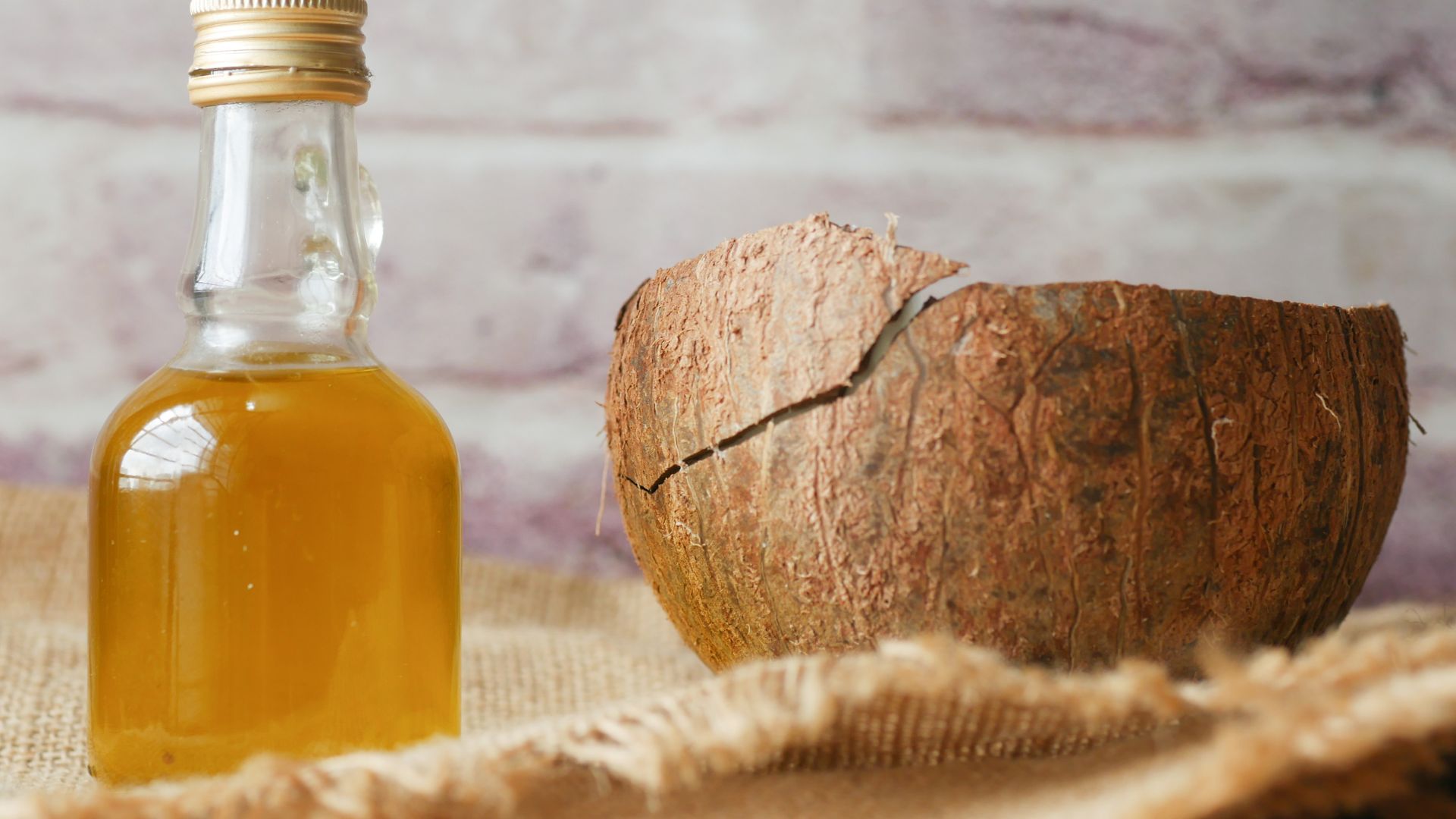Table of Contents
ToggleWhat Is Coconut Oil (CO)?
Coconut oil is derived from the flesh of mature coconuts. Unlike other oils, it has a distinctive flavor and aroma that’s unmistakably tropical. It’s solid at room temperature but melts at a relatively low temperature, which makes it quite versatile in cooking and baking. There are two main types of coconut oil: virgin and refined. Virgin coconut oil is less processed and retains more of the coconut’s natural flavor and aroma, while refined coconut oil has a neutral taste and higher smoke point.== >> Check out the right cookie Coconut oil, tools, and ingredients that you need here.

The Role of Coconut Oil in Cookie Making
Texture and Consistency
One of the most noticeable effects of using coconut oil in cookies is the texture. Coconut oil tends to make cookies crispier on the outside while keeping the inside soft and chewy. This is due to its unique fat composition, which differs from butter and other oils. The saturated fats in coconut oil help to stabilize the cookie dough, leading to a more consistent texture.== >> Check out the right cookie Coconut oil, tools, and ingredients that you need here.
Flavor Profile
Coconut oil adds a subtle hint of coconut to your cookies, which can be a delightful surprise. This is especially true with virgin coconut oil, which has a more pronounced coconut flavor. If you’re making cookies with other tropical ingredients or simply want to add a new twist to classic recipes, coconut oil is a fantastic choice.== >> Check out the right cookie Coconut oil, tools, and ingredients that you need here.
Health Benefits
Coconut oil is often praised for its potential health benefits. It contains medium-chain triglycerides (MCTs), which are fats that are more easily metabolized by the body. While it’s still important to use coconut oil in moderation, incorporating it into your baking can be a step toward a slightly healthier alternative to more processed fats.== >> Check out the right cookie Coconut oil, tools, and ingredients that you need here.

Substitution Tips
If you’re looking to replace butter or other oils with coconut oil in your cookie recipes, a good rule of thumb is to use a 1:1 ratio. This means if your recipe calls for 1 cup of butter, you can substitute it with 1 cup of coconut oil. Keep in mind that if you’re using virgin coconut oil, your cookies might have a slight coconut flavor. For a neutral taste, go with refined coconut oil.== >> Check out the right cookie Coconut oil, tools, and ingredients that you need here.
How to Use Coconut Oil in Your Cookies
- Melt or Softened: Depending on the recipe, you might need to melt the coconut oil or use it in its solid form. If the recipe requires softened butter, you can use solid coconut oil. If it calls for melted butter, just melt the coconut oil before mixing it into the dough.
- Mix Well: Ensure the coconut oil is thoroughly incorporated into the cookie dough. This will help in achieving a consistent texture throughout your cookies.
- Adjust Baking Time: Cookies made with coconut oil might bake slightly faster or slower than those made with butter. Keep an eye on them as they bake to ensure they don’t overcook.
Coconut oil can be a wonderful addition to your cookie-making repertoire. It offers a unique texture and flavor that can really make your cookies stand out.== >> Check out the right cookie Coconut oil, tools, and ingredients that you need here.
Examples of Coconut Oil in Cookie Recipes
To give you a better idea of how coconut oil can enhance your cookie baking, let’s look at a few examples. Whether you’re aiming for a tropical twist or a healthier alternative, these examples will show you how to incorporate coconut oil into your cookie recipes effectively.
Classic Chocolate Chip Cookies
For a classic chocolate chip cookie with a hint of coconut flavor, substitute coconut oil for butter. Use 1 cup of solid coconut oil in place of 1 cup of butter. This swap will give your cookies a slightly crispier edge and a subtle coconut undertone that complements the chocolate chips beautifully. If you’re using virgin coconut oil, expect a more noticeable coconut flavor, while refined coconut oil will keep the focus on the chocolate.== >> Check out the right cookie Coconut oil, tools, and ingredients that you need here.
Coconut Macaroons
Coconut macaroons are a perfect example of a cookie that shines with coconut oil. These cookies are already centered around coconut, so the addition of coconut oil will enhance their flavor and texture. Use 1/2 cup of melted coconut oil in place of other fats in your macaroon recipe. The result will be chewy, slightly crispy macaroons with an intensified coconut flavor.== >> Check out the right cookie Coconut oil, tools, and ingredients that you need here.

Peanut Butter Cookies
To give your peanut butter cookies a tropical twist, replace the butter or other fats in your recipe with coconut oil. Use a 1:1 ratio; for instance, if your recipe calls for 1/2 cup of butter, use 1/2 cup of solid coconut oil. This substitution will add a unique layer of flavor that pairs well with peanut butter, making your cookies stand out from the crowd.== >> Check out the right cookie Coconut oil, tools, and ingredients that you need here.
Oatmeal Cookies
Coconut oil is also a great choice for oatmeal cookies. It can enhance the cookies’ chewiness and add a subtle coconut flavor. Substitute the butter or oil in your oatmeal cookie recipe with an equal amount of coconut oil. This will not only change the texture slightly but also add a new depth of flavor, especially if you’re using virgin coconut oil.== >> Check out the right cookie Coconut oil, tools, and ingredients that you need here.
Vegan Cookies
If you’re baking vegan cookies, coconut oil is an excellent alternative to butter or other animal-based fats. It provides the necessary fat content and works well in recipes that require solid fats. For a basic vegan cookie recipe, replace butter with an equal amount of coconut oil. The result will be deliciously vegan cookies with a pleasant coconut flavor.== >> Check out the right cookie Coconut oil, tools, and ingredients that you need here.
Tips for Baking with Coconut Oil
- Adjust for Temperature: Coconut oil has a lower melting point than butter, so it’s crucial to consider the temperature of your kitchen. If your kitchen is warm, the coconut oil might be liquid. In such cases, refrigerate the oil briefly before using it to achieve the desired consistency.
- Experiment with Flavors: Don’t be afraid to experiment with different types of coconut oil. Virgin coconut oil will impart a strong coconut flavor, while refined coconut oil is more neutral. Depending on your recipe and taste preferences, choose the type that best suits your needs.== >> Check out the right cookie Coconut oil, tools, and ingredients that you need here.
- Watch the Baking Time: Cookies made with coconut oil might bake a bit differently than those made with butter. Keep an eye on them, and make adjustments as needed. Typically, cookies will bake at the same temperature, but they might need a minute or two more or less.
- Store Properly: Coconut oil can affect the texture of your cookies as they cool and store. To maintain their freshness and texture, store your cookies in an airtight container at room temperature. For longer storage, consider freezing them.
== >> Check out the right cookie Coconut oil, tools, and ingredients that you need here.
Drilling Deeper: Coconut Oil vs. Butter in Cookie Making
When it comes to baking cookies, choosing the right fat can significantly impact the outcome. Coconut oil and butter are two popular options, each bringing its own set of characteristics to the table. Let’s dive deeper into the differences and similarities between coconut oil and butter to help you make an informed choice for your next batch of cookies.
Flavor
Coconut Oil: Coconut oil imparts a subtle coconut flavor to cookies, which can be a delightful addition or a distraction, depending on the recipe. Virgin coconut oil has a stronger coconut taste, while refined coconut oil is more neutral. This makes coconut oil a great option for recipes where a hint of coconut complements other flavors.
Butter: Butter adds a rich, creamy flavor that’s often considered essential in classic cookie recipes. It has a distinctive taste that enhances the overall flavor profile of cookies, contributing to the beloved buttery notes in baked goods.== >> Check out the right cookie Coconut oil, tools, and ingredients that you need here.
Comparison: If you want to maintain a classic cookie taste, butter is your go-to. However, if you’re looking to add a unique twist or complement other tropical ingredients, coconut oil might be a better choice.
Texture
Coconut Oil: Cookies made with coconut oil tend to have a crispier exterior while maintaining a soft and chewy interior. The fat in coconut oil contributes to a more stable dough, resulting in cookies that hold their shape well and have a slightly different bite compared to those made with butter.
Butter: Butter generally produces cookies with a softer, more tender texture and a richer mouthfeel. The water content in butter helps create steam during baking, which can result in a more layered and flaky texture.== >> Check out the right cookie Coconut oil, tools, and ingredients that you need here.
Comparison: For a crispy exterior and chewy interior, coconut oil is a solid choice. If you prefer a softer, more tender cookie, butter might be the better option.
Health Aspects
Coconut Oil: Coconut oil contains medium-chain triglycerides (MCTs), which are fats that the body can metabolize more efficiently than other fats. Some studies suggest that MCTs may offer health benefits, such as improved metabolism and cognitive function. However, coconut oil is still high in saturated fats, which should be consumed in moderation.
Butter: Butter contains both saturated and unsaturated fats, along with cholesterol. While it does contribute to a rich flavor, its higher saturated fat content can be a concern for heart health when consumed in large amounts.
Comparison: From a health perspective, coconut oil might offer some benefits due to its MCT content. However, both fats should be used in moderation, especially if health concerns are a priority.
Baking Behavior
Coconut Oil: Coconut oil has a lower melting point compared to butter, which means it can affect the texture and spread of cookies. Cookies made with coconut oil might spread more during baking, resulting in a thinner cookie.
Butter: Butter has a higher melting point and contributes to a more controlled spread of cookies. This can help achieve a more consistent size and shape, particularly in recipes that rely on precise measurements and consistency.== >> Check out the right cookie Coconut oil, tools, and ingredients that you need here.
Comparison: If you want cookies that spread more and have a thinner profile, coconut oil is a good option. For cookies that hold their shape and have a more consistent appearance, butter might be preferable.
Both coconut oil and butter bring unique qualities to cookie baking. Coconut oil offers a tropical twist, a slightly different texture, and potential health benefits due to its MCTs. On the other hand, butter provides a classic, rich flavor and a tender texture that many people love.
When deciding between coconut oil and butter, consider the flavor profile you want, the texture you’re aiming for, and any health considerations you might have. Experimenting with both can also be a fun way to discover which fat works best for your favorite cookie recipes.== >> Check out the right cookie Coconut oil, tools, and ingredients that you need here.
Comparison Table: Coconut Oil vs. Butter in Cookie Making
| Aspect | Coconut Oil | Butter |
|---|---|---|
| Flavor | Adds a subtle coconut flavor; virgin oil has a stronger coconut taste, refined oil is neutral | Rich, creamy, and traditional butter flavor |
| Texture | Crispier exterior, softer and chewier interior | Softer, more tender texture; buttery richness |
| Health Aspects | Contains medium-chain triglycerides (MCTs), high in saturated fats | Contains both saturated and unsaturated fats, with cholesterol |
| Melting Point | Lower melting point; affects spread and texture | Higher melting point; more controlled spread |
| Baking Behavior | Can cause cookies to spread more; may result in thinner cookies | Provides a more controlled spread; cookies tend to hold shape better |
| Types | Virgin (strong coconut flavor), Refined (neutral taste) | Unsalted (best for baking), Salted (can alter flavor) |
| Substitution Ratio | 1:1 for replacing butter | 1:1 for replacing coconut oil |
Key Notes and Considerations
- Flavor Profile:
- Coconut Oil: Ideal for adding a tropical twist or when the coconut flavor enhances the overall recipe. If the coconut flavor is not desired, opt for refined coconut oil to minimize coconut taste.
- Butter: Best for traditional cookie recipes where a rich, creamy flavor is essential. Butter’s flavor is often preferred in classic cookies like chocolate chip or sugar cookies.
- Texture:
- Coconut Oil: Produces cookies with a crisper edge and softer center. This can be desirable in certain recipes but may result in a different texture compared to butter-based cookies.
- Butter: Creates a tender, more delicate texture with a characteristic buttery richness. Ideal for recipes where a soft and chewy texture is preferred.
- Health Considerations:
- Coconut Oil: While it has potential benefits due to MCTs, it is high in saturated fats. Moderation is key, and it’s best used as part of a balanced diet.
- Butter: Contains both saturated fats and cholesterol, which should be considered in a heart-healthy diet. Using unsalted butter allows for better control of salt levels in baking.
- Baking Behavior:
- Coconut Oil: Lower melting point can cause cookies to spread more during baking. This may require adjustments in baking time or temperature to achieve desired results.
- Butter: Higher melting point allows for more control over cookie shape and size. Butter’s steam helps create a softer, flakier texture in cookies.
- Substitution Tips:
- Coconut Oil: When substituting for butter, use a 1:1 ratio. Be mindful of the type of coconut oil used and how it might impact the flavor and texture of your cookies.
- Butter: Can be replaced with coconut oil in a 1:1 ratio as well. Consider the flavor and texture changes that might occur and adjust recipes accordingly.
- Types:
- Coconut Oil: Virgin oil is great for flavor but may be too strong for some recipes; refined oil provides a neutral option.
- Butter: Unsalted butter is preferable in baking to control the amount of added salt; salted butter can alter the intended flavor balance.== >> Check out the right cookie Coconut oil, tools, and ingredients that you need here.
FAQs on Using Coconut Oil vs. Butter in Cookie Making
1. Can I use coconut oil in any cookie recipe that calls for butter?
Yes, you can substitute coconut oil for butter in most cookie recipes. Use a 1:1 ratio for the best results. Keep in mind that coconut oil can affect the flavor and texture of your cookies, so it might be worth testing with a small batch first.
2. Will using coconut oil make my cookies taste like coconut?
It depends on the type of coconut oil you use. Virgin coconut oil has a distinct coconut flavor, while refined coconut oil is neutral. If you prefer not to have a coconut taste, opt for refined coconut oil.
3. How does coconut oil affect the texture of cookies compared to butter?
Cookies made with coconut oil typically have a crispier edge and a softer center. Butter generally produces cookies that are more tender and rich. The fat composition of coconut oil can lead to a different texture, so it’s important to adjust your expectations.
4. Is coconut oil a healthier option than butter for baking cookies?
Coconut oil contains medium-chain triglycerides (MCTs) that may offer some health benefits, but it is also high in saturated fats. Butter has both saturated and unsaturated fats and cholesterol. Neither is a perfect health choice, so moderation and balance are key.
5. Can I use coconut oil for vegan cookie recipes?
Yes, coconut oil is a great substitute for butter in vegan recipes. It provides the necessary fat without the need for animal products. Just be sure to use it in a way that complements the other ingredients in your vegan cookie recipe.
6. Do I need to adjust baking times when using coconut oil instead of butter?
Cookies made with coconut oil might bake slightly faster or slower than those made with butter due to the difference in melting points. Keep an eye on your cookies as they bake and adjust the time as needed.
7. How should I store cookies made with coconut oil?
Store cookies made with coconut oil in an airtight container at room temperature to maintain their freshness. For longer storage, consider freezing them. Keep in mind that coconut oil can affect the texture of cookies as they cool and store.
8. Can I mix coconut oil with other fats in cookie recipes?
Yes, you can mix coconut oil with other fats like butter or vegetable oil. This can allow you to balance the flavor and texture according to your preferences. Experiment to find the best combination for your recipes.== >> Check out the right cookie Coconut oil, tools, and ingredients that you need here.
Final Words
Whether you’re an avid baker or just looking to try something new, experimenting with coconut oil in your cookie recipes can lead to exciting and delicious results. While coconut oil offers unique benefits such as a distinctive flavor and potential health advantages, butter remains a classic choice for its rich taste and tender texture. By understanding the differences and considering how each ingredient affects your cookies, you can make informed choices and create treats that perfectly suit your taste and dietary preferences.
Feel free to experiment with both coconut oil and butter to see which works best for your favorite recipes. And remember, baking is as much about creativity and personal preference as it is about following recipes, so don’t be afraid to try new things and enjoy the process.
Related Posts
- DC: Dry Coconut role in cookie making Explained
In this topic, I’m going to talk about DC –…
- RS: Raisin Syrup role in cookie making Explained
In this blog, I'm talking about Raisin Syrup (RS) and…
- GI: Ginger role in cookie making Explained
In this blog post, I’m going to talk about ginger,…
- MR: Maple Rum role in cookie making Explained
In this topic, I’m going to talk about MR –…
- GB: Gluten-Free Blend role in cookie making Explained
In this blog, I’ll talk about my journey with gluten-free…
- PC: Peanut Chips role in cookie making Explained
In this topic, I’m going to talk about peanut chips,…
- HA: Hazelnuts role in cookie making Explained
In this blog, I’m going to talk about hazelnuts and…
- SB: Sea Salt role in cookie making Explained
When it comes to baking cookies, there’s more to consider…
- BL: Blueberry role in cookie making Explained
When it comes to adding a burst of flavor and…
- BF: Buttermilk Powder role in cookie making Explained
When it comes to baking cookies, every ingredient plays a…
- EB: Egg Beater role in cookie making Explained
When it comes to baking cookies, the tools and techniques…
- CU: Cocoa Butter role in cookie making Explained
In this topic, I’m going to talk about cocoa butter…
- DF: Dairy-Free role in cookie making Explained
In this blog, I’m going to talk about dairy-free ingredients…
- DS: Dates role in cookie making Explained
When it comes to baking cookies, I've always been fascinated…
- SH: Sweet Honey role in cookie making Explained
When it comes to baking, the ingredients you choose can…

